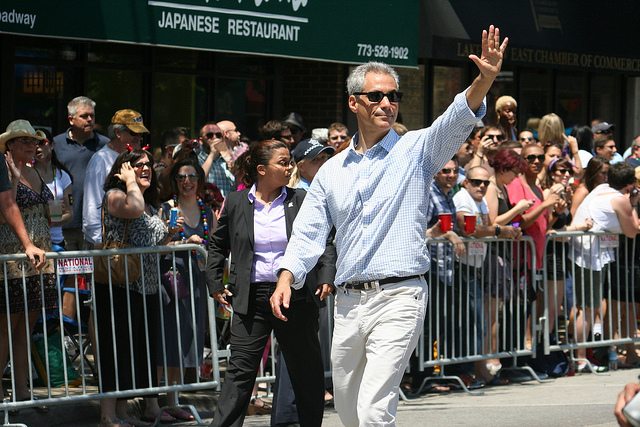Rahm Touts His First 100 Days as Mayor
By Chuck Sudo in News on Aug 23, 2011 6:00PM
Today marks 100 days since Rahm Emanuel was sworn in as Mayor of Chicago. Ever since Franklin D. Roosevelt first used the first 100 days as a barometer for measuring his agenda, politicians have eyed the marker as a chance to control their message.
You know Emanuel wasn't going to let the moment pass without looking back at what his administration has achieved since he took office. Hell, he graded himself on his first 30 days in office. The press release we received from the Mayor's office ticked off an impressive list of achievements.
- Outlined $75 million in savings for 2011 on the first day in office, over $50 million of which have already been realized.
- Announced the redeployment of nearly 750 additional officers to Chicago’s neighborhoods.
- Secured more than 4,000 private-sector jobs in neighborhoods across the city
- Signed an Executive Order on his first day in office that begins to close the revolving door between City Hall and lobbyists
- Developed a new City-wide Credit Card and Reimbursement Policy, reduced the number of City credit cards from 500 to 30 and eliminated City petty-cash funds
- Initiated reforms to the City’s procurement process by posting non-competitive contracting online for public review and implementing a Reverse Auction initiative
- Implemented unprecedented City procurement modernization initiative to reach about $25 million in savings by 2013
- Championed a stronger curfew ordinance to protect young people across the city
- Launched Internet Essentials, a public-private partnership that will provide access to high-speed, reliable Internet service for families of 330,000 students across the city
- Unveiled the Micro-Market Recovery Program to address foreclosures and stabilize property values on a community level to protect residents and neighborhoods
- Advocated for state legislation to enable Chicago Public Schools to lengthen the school day and year
- Engaged with Chicagoans through innovative public forums by hosting a groundbreaking Facebook town-hall, answering questions during a telephone town-hall, holding a live conversation during a virtual good government town-hall and launching the City’s first-ever interactive budget website, Chicagobudget.org
- Published more than 200 data sets, allowing the people across Chicago to see City employee salaries, crime statistics, and contracts dating back to 1993, among many others, as part of an unprecedented open data initiative.
Emanuel has also, with one notable exception, played well with the press. Emanuel still espouses the same vague calls for reform that carried him to office but, overall, he has been a stark contrast to his predecessor in his handling of the media.
The comparisons to Richard Daley will evidently continue. Emanuel inherited a tumbleweed of a budget and ticking time bombs with labor from Daley. So far, he hasn't directly blamed Daley for the mess, and Emanuel has been deft to split the difference, praising Daley whenever possible while stating business as usual cannot continue.
By most accounts, Rahm has hit the ground running as mayor. Both the Tribune and Sun-Times recognized Emanuel's aggressive start to his mayoralty, while The Economist praised the cabinet he's assembled. We've been impressed by the work of Chief Technology Officer John Tolva and Department of Transportation Commissioner Gabe Klein, in particular, for bringing innovative thinking to their respective departments.
The jury is still out on Chicago Public Schools CEO Jean-Claude Brizard and School Board President David Vitale. They've inherited a school system that is woefully under-performing but the fight they appear to be picking with the Chicago Teachers Union appears to us a bit misguided. CPS' apparent use of one-time dips into reserve funds and a maximum property tax increase for its proposed 2012 budget also contradicts Emanuel's vow not to do the same with the city budget.
Emanuel's labor problems also extend to other city union workers. Residents are supportive of his wishes for work rule changes, but Emanuel has not responded to calls to cut the fat from city government from the soft underbelly of middle management nor given the Office of Inspector General broader powers in rooting out corruption.
The latter requires a rapport between the Mayor's and OIG offices. Emanuel could probably save as much, if not more, in taxpayer dollars by eliminating much of the middle management. We aren't certain where hiring Accenture to save $25 million in city contracts falls in that.
